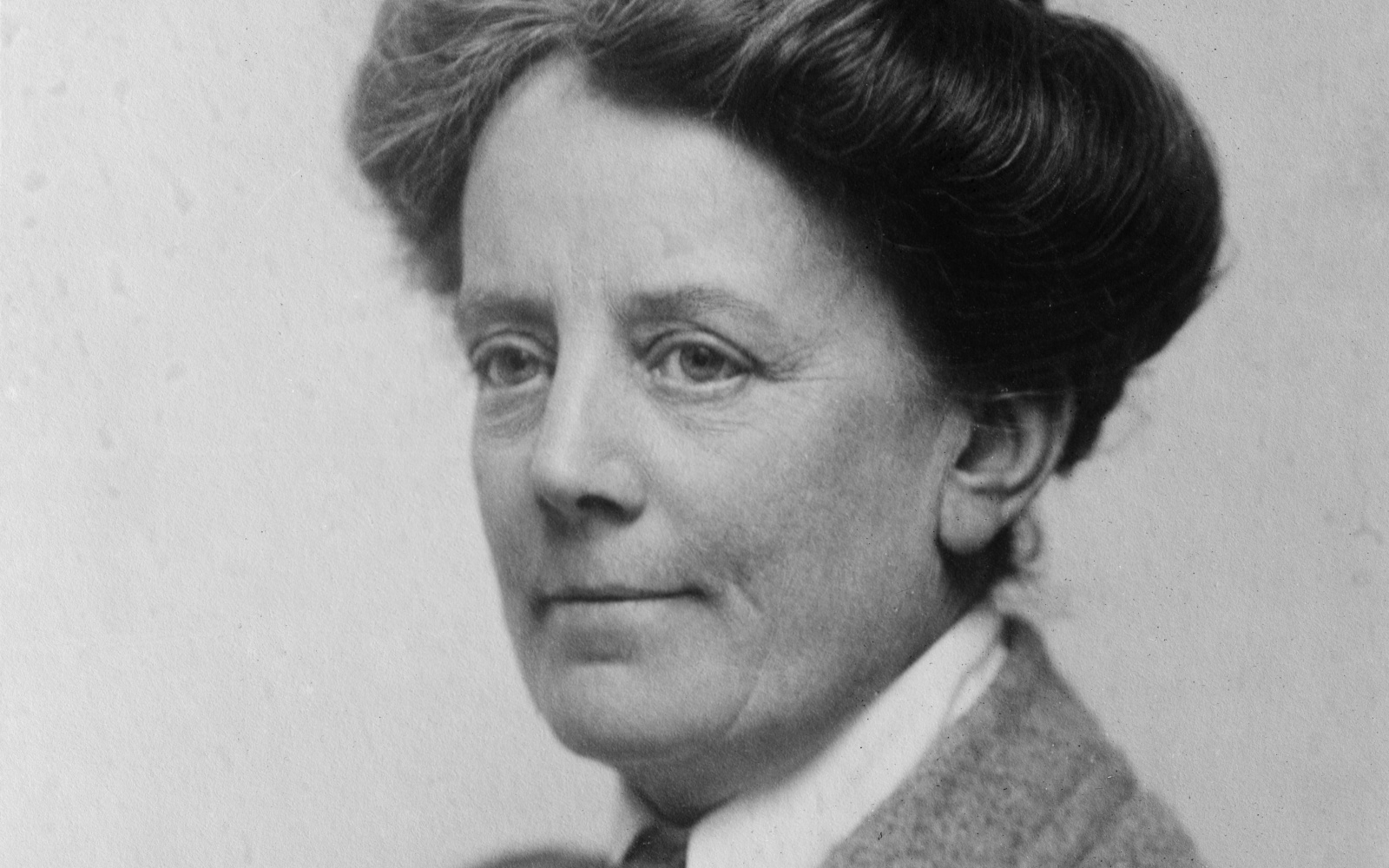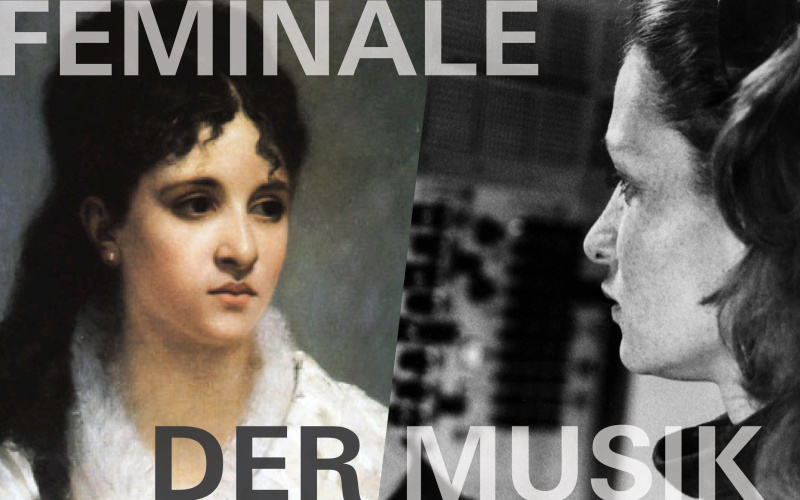Dame Ethel Smyth
Feminale of Music
Her most famous composition is probably her »March of the Women«, which became the anthem of the suffragettes, the English women's rights movement that fought for the introduction of women's suffrage at the turn of the century. Smyth became involved in this movement in the years 1911-13, which led to a two-month prison term in 1912.
Ethel Smyth was born in Kent, England on 23 April 1858. Throughout her life Ethel Smyth fights against resistance. It begins at home, where her father in particular wants to prevent her from studying composition in Leipzig. Ethel asserts herself, with drastic means, up to and including a hunger strike. At the Leipzig Conservatory, she soon realizes that the level does not meet her expectations. However, she finds a substitute in private lessons with Heinrich von Herzogenberg. Especially to his wife Elisabeth a close friendship develops. In her salon she meets Clara Schumann, as well as Johannes Brahms, whose music she admires very much, but who is personally ironic and condescending towards her, as Ethel Smyth describes in her autobiographical writings.
During her studies in Leipzig she exclusively composed chamber music works, later also orchestral and choral works and operas. Her Great Mass in D major of 1891 does not premiere until two years after its completion, »after a long and tough struggle, only through the interventions of Empress Eugénie and an audition with Queen Victoria«, as the musicologist Melanie Unseld reports (MUGI, »Musik und Gender im Internet«).
She will have a similar situation with many other compositions, Smyth has to fight again and again for the performance of her works. On the other hand, she is also supported by influential conductors, among them Sir Thomas Beecham, Bruno Walter, Felix Mottl and Arthur Nikisch. Her works are performed in major opera houses and concert halls in Europe and the USA. Ethel Smyth's main compositional works are her six operas, which she composed between 1892 and 1924.
From 1913 onwards, an ear disease develops, which finally leads to complete deafness in 1939. For this reason the emphasis shifted from compositional to literary activity. Ethel Smyth's offensive handling of her lesbian disposition, of which she makes no secret, is still remarkable. The musicologist Susanne Wosnitzka, for example, reports that Ethel Smith was inspired by »one of her great loves, Pauline Trevelyan« to her »spectacular mass in D [...]«.
Music pieces
Serenade in D major for orchestra published by Classical Music goturhjem2 and performed by the BBC Philharmonic Orchestra: Odaline de la Martinez (conductor), Sophie Langdon (violin), Richard Watkins (horn), Naxos of America (commissioned by Chandos)
Piano Trio in D minor, Allegro vivace published by and played by the Chagall Trio, to be found on »Ethel Smyth: Impressions That Remain«, 2009 meridian records.
The Wreckers: Overture released by and performed by BBC Symphony Orchestra: Sakari Oramo (conducting) released on »Smyth: Mass in D Major & Overture to The Wreckers«, 2019 Chandos, NAXOS of America.
March of the Women published by and sung by the Glasgow University Chapel Choir: Katy Lavinia Cooper (conductor), Harry Campbell (video)
Disclaimer
-
Links to external websites of other providers
The ZKM’s express objective is the accuracy and current relevance of any information it makes available on this web site. Mistakes and ambiguities cannot, however, be fully excluded. For this reason, the ZKM is unable to fully guarantee the current relevance, accuracy, completeness or quality of the information it makes available. The ZKM is not subject to coercible legal rules and regulations and to any kind of damages of a material or immaterial nature that may possibly be caused by the use or non-use of the information provided, including free downloads. The ZKM reserves the right to change or delete, to temporarily or permanently suspend access to the web sites at any time.
The responsibility for »external content« to which access is made, in the form of e.g., links, presupposes, among other things, positive knowledge of illegal or punishable content. The ZKM has no influence on this external content and entirely distances itself from such content. Should the displayed external web site include unlawful or offensive content, the ZKM expressly distances itself from such content. When made knowledgeable of such content, the ZKM will deactivate the corresponding link. The same holds for external entries contained in Blogs and discussion forums, links directories, mailing lists and all other forums of databanks operated by the ZKM, the content of which is rendered possible via write access.
All content of the present web site (texts, images, video stills, videos, audios, graphics etc.), the structure as well as the layout of this web site is protected by copyright. These contents, and the information made available by the ZKM (e.g., text and image materials) are available exclusively for individual usage by users of this web site, and not for commercial purposes. These contents may be distributed and copied, made public on the Internet and used for commercial purposes only with the prior consent of the ZKM. Similarly, the placing of deep links, inline links, frame links or similar links in which the ZKM web site is not clearly evident as source, is permitted only with the prior consent of the ZKM. Messages and references to content »share« in social media (e.g. Facebook) do not come under the proviso of this reserve approval. For press releases and photographs valid instructions for usage can be found at: www.zkm.de/en/press/service.
All labels and trademarks named and protected by third parties are subject to the unreserved stipulations of the respective registered owners. That trademarks are not protected by third part rights cannot be assumed merely by mention of the name.
This disclaimer is to be understood as part of the ZKM’s Internet content. In so far as part or single formulations of this text do not, are no longer or are do not entirely correspond to this legal provision, the remaining parts of this document remain unaffected in its content and validity.

